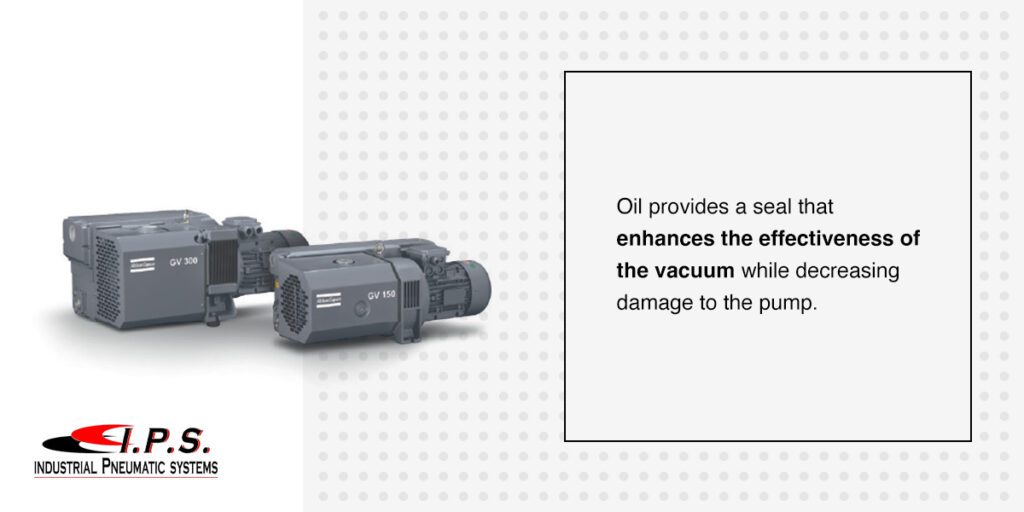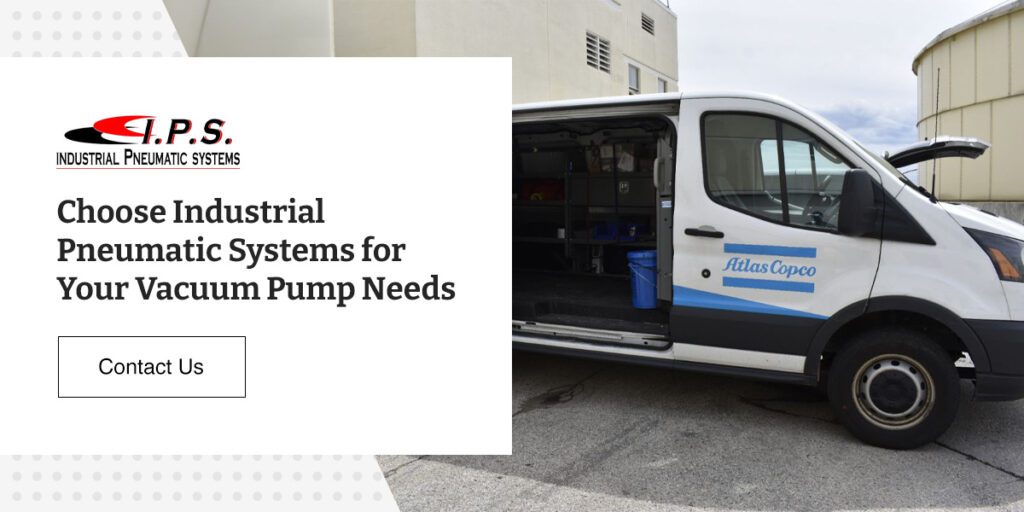
Vacuum pumps have existed for over 300 years, and thanks to technological advances, they have changed a lot over the centuries. Vacuum pumps are an essential component of many manufacturing businesses. While their primary function is vacuuming, the way they operate makes them suitable for various uses, industries and businesses.
Understanding what a vacuum pump is, what it does and the different types available can help you select the perfect pump for your business. Whether you’re considering getting a vacuum pump and need some help figuring out your next steps, or you already have one and you’re eager to learn more about vacuum pumps, this guide can help you.
What Is a Vacuum Pump?
A vacuum pump is a device designed to remove gas particles from a sealed space to create a partial vacuum. Without vacuum pumps, particles can stay in a system and cause it to run at a lower capacity or even corrode. Typically, a vacuum pump’s main purpose is to clean and seal an area, protecting it from the air and other gasses.
A vacuum pump can also convert energy into pressure. The higher the atmospheric pressure, the more effective the vacuum. Different types of vacuum pumps perform different functions, making them ideal for use in various industries. A wide range of industrial processes use vacuum pumps for industry-specific functions, including cleaning and degassing.
You can also adjust vacuum levels according to your needs, so whether you require a low-pressure vacuum pump or a vacuum with solid suction, there’s something for you.
Types of Vacuum Pumps
There are several types of vacuum pumps, but three of the most common ones are:
1. Rotary Vane Vacuum Pumps

Rotary vane pumps use vanes mounted to a rotor in cylindrical housing to move fluids and gases. They’re ideal for the automotive industry, as manufacturers use them for different applications.
A popular option is the oil-sealed rotary vacuum pump. Oil provides a seal that enhances the effectiveness of the vacuum while decreasing damage to the pump. Lubricating a rotary vane vacuum pump with oil also helps with temperature control.
2. Screw Vacuum Pumps
Screw vacuum pumps are versatile products that can be used across multiple industries. This type of pump offers the following benefits:
- Increased efficiency: Thanks to advances in technology, many modern oil-sealed rotary screw vacuum pumps are designed to deliver desired results quickly and effectively.
- Multiple pressure ranges: Screw vacuum pumps can provide the pressure needed for a specific application, making them ideal for industrial vacuum applications.
- Low vacuum capabilities: Their adjustable pressure ranges make screw vacuums well-suited to industries that require low vacuum abilities.
- Reduced environmental impact: Since these valves retain a lot of oil, thus reducing waste, they are much better for the environment. They also help businesses cut back on energy usage.
- Lower noise levels: These types of vacuum pumps also operate at much lower noise levels than other vacuums. Since excessive noise can damage employees’ productivity, this is an excellent solution for businesses that lack the space to store their vacuum pumps away from their workers.
3. Liquid Ring Vacuum Pumps
Liquid ring vacuum pumps work similarly to rotary vane pumps, but the difference is that they have a liquid ring that forms a compression seal. This seal helps make this type of vacuum pump low-friction.
These pumps also only have one moving part, the rotor, also known as the impeller. These pumps have many uses. Here are some industries and applications that often rely heavily on liquid ring vacuum pumps:
- Medical
- Lifting
- Ceramic
- Environmental engineering
Industry Applications of Vacuum Pumps
Vacuum pumps are incredibly versatile, as they are used in various industries to fulfill multiple functions. Here are some of the most common applications of these devices:
- Manufacturing uses: Vacuum pumps are often used for heavy equipment since they make the manufacturing process more productive and efficient. Manufacturers use industrial vacuum pumps throughout different stages of metal fabrication, such as hardening, tempering and diffusion bonding. Vacuum pumps are also very useful in printing, woodworking and plastic manufacturing.
- Agricultural uses: The agricultural sector relies heavily on machines and technological systems, and vacuum pumps can help improve these processes. These machines often depend on suction, so a strong industrial vacuum pump can help them operate more smoothly. Vacuum pumps in agriculture can be used for loading, conveying, milking and cooling systems.
- Health care: Vacuum pumps are commonly used across various health care applications, including those in the medical, dentistry and pharmaceutical niches. They maintain sterile environments during surgical procedures, assist with decontamination in drug manufacturing and help create crown molds in dentistry procedures.
Choose Industrial Pneumatic Systems for Your Vacuum Pump Needs
Industrial Pneumatic Systems is a knowledgeable independent distributor of vacuum equipment, pumps and air compressors in the Midwest. We proudly serve Minnesota, North Dakota, South Dakota, Iowa and Wisconsin with expert vacuum solutions.
Whether you’re looking to buy an industrial vacuum pump or you already have one that needs servicing, Industrial Pneumatic Systems has the expertise needed to help you. Our comprehensive services include repairs, system audits and rentals. We also have various vacuum pumps available for sale, including:
- Oil-sealed rotary screw vacuum pumps
- Oil-sealed rotary vane vacuum pumps
- Liquid ring vacuum pumps
We offer free technical support and consultations to help you address any concerns you may have. With more than a decade of experience, affordable prices, a wide range of products and seasoned pros, we can assist you with your vacuum pump needs if you’re located in Minnesota or the surrounding states. Contact us for more information on our products and services today.

